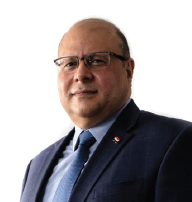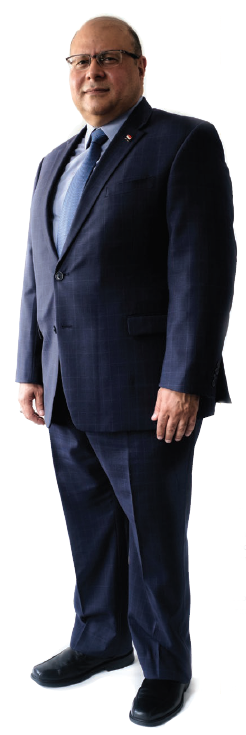
Jamal Abdullah al-Sallal has been Yemen’s man in Ottawa since November 2016, and before that, for four months in 2014, he was his country’s minister of foreign affairs. He also served as ambassador to the United Nations for three years and ambassador to Iran for five years, postings that inform his work to this day. From 1986 to 1991, when he was posted to Washington, he was responsible for Canadian affairs.
Al-Sallal is clearly a professional in his own right, but he’s also the son of a former Yemeni president. His father, Abdullah al-Sallal was the leader of the North Yemeni Revolution of 1962, which deposed King Muhammad al-Badr and ended the reign of the Mutawakkalite Kingdom. Al-Sallal Sr. served as the first president of Yemen from 1962 to 1967. Asked about his “revolutionary” father, his son says “he was a revolutionary for good — for the good of the country.” Diplomat’s editor Jennifer Campbell sat down with the ambassador.
Diplomat magazine: A recent United Nations report accuses all three sides in the Yemeni conflict of war crimes — the Houthis, the Saudi-led coalition and your government. Is your government responsible for war crimes?
Jamal Abdullah Al-Sallal: We mentioned many times, on many occasions, that the Yemeni government and the Arab coalition led by Saudi Arabia is respecting international law and human rights, as well as the laws of war. We do all we can to not target any civilians. Lately, there was the incident that was reported in the media that accused the government and the Arab coalition of hitting the hospital in Hodeida, as well as the fish market. They accused us of targeting civilians with terrorist acts. This accusation came from the so-called ministry of health under [Houthi] control and was leaked to some organizations, such as the EU, and then the militia [the Houthi rebels] started to make statements accusing the Arab coalition of this. But a few days later, the Arab coalition gave evidence that the militia fired missiles from their [own] controlled area to the hospital and fish market. The Arab coalition had nothing to do with it. Unfortunately, this coincided with [UN] special envoy to Yemen, Martin Griffiths, giving his remarks and updates to the Security Council. That inflamed the situation. So sometimes incidents like this repeatedly happen [and] this militia accuses the government and Arab coalition. At the same time, we regret and are sorry for any incidents that involve civilians. In war, you can’t guarantee no casualties 100 per cent, but at least you’re doing what you can to protect your people.
Whenever such incidents happen — once we reach a conclusion — we go to the public. The [Houthi] militia is using civilians as human shields, firing missiles in heavily populated areas. Once there’s a missile fired, they retaliate. They do it sometimes intentionally within the populated areas. This has happened many times, actually.
![Yemen's war: ‘The human rights situation is really critical.’ 2 “[Government and Arab coalition forces] have liberated between 83 and 85 per cent of the land.“ (Photo: Dyanne Wilson)](https://diplomatonline.com/mag/wp-content/uploads/2018/10/DIPLOMAT_2018-10-07_0033.png)
JAAS: We have liberated between 83 and 85 per cent of the land. The rest is still under control by them. However, unfortunately, [they occupy] the most populated area and that includes [the capital] of Sana’a.
DM: How much hope is there for the government to get Sana’a back?
JAAS: We consider ourselves lucky because we have agreed-upon references from the vast majority of the Yemeni people. We have the GCC initiative [an agreement for the transition process in Yemen by the Gulf Cooperation Council whose members are The United Arab Emirates, Bahrain, Saudi Arabia, Oman, Qatar and Kuwait and Yemen] as well as the National Dialogue Conference and its outcomes and Security Council Resolution 2216, which came up with a broad map for peace solutions in April 2015.
With these advances, we’ve had previous consultations — from Geneva to Kuwait. We were very close to signing this peace agreement, then Iran and its proxies interfered, advising the al-Houthis not to sign or to withdraw. This is proof of Iran meddling in our affairs. Once we fulfil these references, and Security Council Resolution 2216, peace [can be achieved] because [it says they must cease occupying all the government buildings and let the government re-occupy them.] [They must also] hand over all heavy weapons that [they] have looted from the military bases to the legitimate government. [They are supposed] to become a political party and to join the government in that position, to prepare and be part of the transition to reach the democratic federal state of Yemen.
They were part of this equation in the National Dialogue Conference, which was sponsored by the United Nations and the 18 countries sponsoring the peace process. But once we reached the conclusion, they started to go against the government and everything we’d agreed upon. We feel fortunate that we have it all in writing.
If you go back to the history, you find out that during the Arab Spring, ex-president Ali Abdullah Saleh handed over the power and authority to current president [Abdrabbuh Mansur] Hadi and this was under the GCC initiative. From that point, we started the National Dialogue Conference that included all the political parties, including women, youth, academic partners. From Day 1, [the Houthis] were there. They can’t claim they weren’t part of it. So after that, they came from Sa’dah to Sana’a, detained the president and vice-president, put them under house arrest, attacked the presidential palace, killing the president’s security detail. The president was able to escape to Aden and they followed him there and raided that compound. Then the president went to Riyadh.
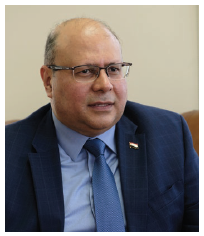
DM: What are the Houthis’ demands or goals?
JAAS: Usually, when they talk to the special envoy, they say they’re willing to have peace and stop the war. Nobody wants the war. We need to stop it, but we need to work together. They don’t want to fulfil the security demands from their side. You cannot just implement the political side.
When they forced the government to sign, the first special envoy was there, but [the Houthis] wouldn’t implement the security side, which [called for them to] pull out from the ministries and cities. They don’t want to do that.
We are hoping with the new special UN envoy, Martin Griffiths [things change]. We will do whatever we can to make his mission successful. And we are hoping the al-Houthis will, too.
DM: To what degree is this a civil war and to what degree is it a proxy war between Saudi Arabia and Iran?
JAAS: It is not a civil war. The legitimate government is trying to preserve our identity as Arabs and protect our country from the meddling of Iran. Iran is trying to create another Hezbollah in Yemen. Iran has an expansion agenda in the region — but not only the region. What are they doing in Latin America and Africa? They’re very ambitious and it’s in their constitution that they should export the revolution. This goes back decades. You’re talking about this group [backed by Iran] against the rest of the country.
DM: Do you have any idea how much support Iran is providing to the Houthis? In what form?
JAAS: Iran is providing high-tech weapons, missiles, drones, landmines, night vision equipment and other weapons, in addition to financial and military support through advisers, experts and fighters, in co-operation with Hezbollah in Lebanon.
The UN-sanctioned committee confirmed, in December 2017 and July 2018, reports to the UN Security Council, that the al-Houthi rebels continue to receive financial and military support from Iran, including short- and long-range missiles, drones and high-tech anti-tank missiles. And there’s a high possibility of [their] attaining ground-to-air missiles.
Other friendly countries in the region documented many attempts by Iran to try to smuggle in equipment. In addition to that, we caught many attempts through ships, vessels, etc., that contained a lot of weapons. We just had, on Aug. 23, a missile that came from Somalia, with 270 high-explosive barrels travelling by boat toward our border. In addition to that, we caught some shipments of drones and other military weapons.
If you go to the statements, that after the al-Houthis entered Sana’a, Ali Akbar Velayati [Iran’s Ayatollah Ali Khamenei’s adviser on international affairs] said Sana’a was the fourth capital to fall into the hands of Iran. [The others, according to media reports, are Beirut, Bagdad and Damascus.]
Maj. Gen. Qasem Soleimani, commander of the IRGC [Iran’s revolutionary guards], recently said that the Red Sea is no longer safe.
[There was another] incident in June 2018 in which the secretary-general of
Hezbollah called for, and encouraged openly, the support of al-Houthi rebels, both militarily and otherwise.
![Yemen's war: ‘The human rights situation is really critical.’ 4 ”Iran is providing [among other things] high-tech weapons, missiles, drones, landmines, night-vision equipment.“ (Photo: Dyanne Wilson)](https://diplomatonline.com/mag/wp-content/uploads/2018/10/DIPLOMAT_2018-10-07_0035.png)
JAAS: It’s a serious threat to international maritime traffic and international trade in the southern part of the Red Sea, especially the city of Hodeida and its port, in addition to the port of Salif, which are all under the control of al-Houthi militia.
Iran is behind the threats to maritime traffic in that region by providing naval mines, speed boats that are used in suicide missions and the development of a missile base that is used to target passing ships in the southern part of the Red Sea and Bab-el-Mandeb Strait. The more sanctions imposed on Iran, the bigger their threat to international maritime traffic and navigation. This is all part of Iran’s agenda to expand its influence in the region. In addition, the militia targeted Saudi oil tankers, which almost caused an environmental crisis and threatened to cause a closedown in maritime traffic in the region. This is not the first time. Under its sovereign right, the Yemeni government is keen to remove the naval mines left by al-Houthi rebels to ensure the regular flow of humanitarian aid and access to those in need, and to prevent the smuggling of Iranian weapons through the ports of the governate in Hodeida. Yemen wants to restore the west coast in order that international trade operates normally through the Red Sea. It is also the responsibility of the international community to protect this vital strait.
Special envoy Griffiths tried his best [to liberate] Hodeida. Unfortunately, he failed and this didn’t just start now. In July 2017, [the al-Houthi rebels] promised they would leave. For one year, we [have been] waiting. In our plan to liberate Hodeida, we took all the precautions not to harm civilians. We fulfilled the request from Griffiths. We ceased our fire to give him time, while they continued to get more support, digging ditches and starting to cut services to civilians. They also punished civilians for welcoming the legitimate government to liberate the region.
DM: What conditions would it take for the Houthis to accept a ceasefire?
JAAS: If we knew, we’d discuss it with them. They don’t want the removal of their weapons, for example. The conditions were all there and then they started fighting again. We talk about [them] handing over the ministries, public institutions and weapons. They’re basically saying ‘We will rule you or kill you.’
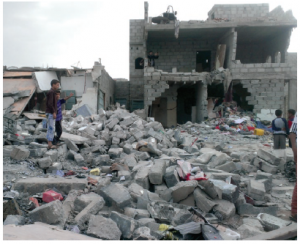
DM: Have there been any efforts on either side to pause this conflict, if for nothing else than to provide a safe passage for aid and aid workers to arrive?
JAAS: The human rights situation is really critical. Almost 22.2 million Yemeni people are in need of some form of assistance — 11.3 million are in acute need of humanitarian assistance; 16 million don’t have access to safe drinking water or sanitation. Almost half of the health facilities have been destroyed. More than 60 per cent of educational facilities have been damaged and 3.4 million children are not in school. Also, 3.3 million suffer from acute malnutrition, which is 54 per cent more than 2015; 2.2 million of them are children. There is a fear that we’re losing a child every 10 minutes.
Another 4.5 million urgently need shelter and basic domestic requirements; 14 million can’t get basic medical care; 14.1 million suffer from lack of basic food needs, which is 200 per cent more than were suffering in 2015. There are 4.5 million displaced persons internally; 1.7 million suffer from moderate malnutrition; and 15 million lack medical services.
We have the high relief committee, headed by Minister [Abdel Raqib] Fatah. This committee co-ordinates with other friendly countries and NGOs to facilitate aid coming into the country.
I’d like to thank the Canadian government and the Canadian people for their generosity of supporting the people of Yemen. They have granted $65 million since March 2017 through the UN and special agencies for humanitarian assistance. We appeal to the Canadian government to do more. We also have other friendly and brotherly countries who are helping, including the U.S., EU, U.K., Germany, Japan. I don’t want to miss anyone. The Saudis have been very generous as well as UAE, Kuwait and Qatar.
DM: But can the aid workers get in?
JAAS: We’ve liberated 80 per cent of the territory, so you have many ports and airports, including the port of Aden. We have also opened an airport in Hodeida. Just recently, [the UN] issued thousands of permits and many visitors are entering. The procedure for aid entering is through the Arab coalition and the United Nations’ OCHA [Office for the Co-ordination of Humanitarian Affairs.]
The reason the Saudis said it was dangerous to bring in aid is because sometimes the militia is attempting to smuggle in weapons under the auspices of workers. For aid, there’s a procedure, a protocol between the Arab coalition and the UN. They have regulations they follow to allow these ships to come to our ports and deliver the goods. In our experience in the past, the militia are looting the international assistance to fund their war machine — that’s why we should liberate Hodeida. We want to make sure the humanitarian assistance goes to the needy ones, but in general, the ports are open.
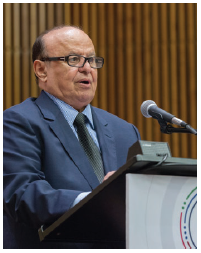
DM: What would be your solution to end this conflict? Or at least gain a ceasefire?
JAAS: If we think about our own people, if we think about our country sincerely, and we put this as a first agenda, and we work very hard and give concessions to reach an agreement, we can reach a very safe [outcome] for our future. Each time we speak, the government gives huge concessions. President Hadi says he represents all Yemenis, including al-Houthis. We have nothing against them. If they are ready to fulfil the peace agreement, we can have peace.
DM: As you mentioned in the comments from Khomeini’s adviser, Iran now claims to control four Arab capitals: Baghdad, Damascus, Beirut and Sana’a. Is this true in your view and, if so, what is the projected future of this Iranian ascent in the Middle East?
JAAS: It’s not true. Even if you have one side of the equation in the country, working as a proxy for you, we’ve learned from history, no one can continue by some kind of dictatorship, forcing people to act in a certain way. Eventually, people will want to be free.
No one can impose anything from abroad. We see it all over the world. The people will prevail; democracy will prevail; human rights and [rule of] law will prevail. We cannot live in a jungle.
DM: What were the problems with the previous attempts at peace?
JAAS: The “peace and partnership agreement” was forced on us by the al-Houthis in 2014. They forced the government to sign the agreement. [And then, they] only wanted to fulfil the political side of the agreement, not the security side. Even [though it’s their own agreement], they don’t want to implement it.
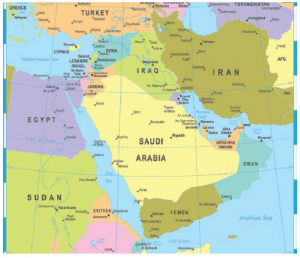
DM: Are the Houthis using child soldiers?
JAAS: According to the ministry of human rights, the al-Houthis are committing a lot of violations and crimes against women and children. They use collective punishment such as seizing whole provinces with the threat of landmines and destroying the homes of their opponents.
In addition, the final report from [the government] in June 2018 shows they’re recruiting children as soldiers. Yemen has signed the Paris Accord, so they’re committing a violation by recruiting those youngsters instead of letting them go to school — taking advantage of their poverty. The numbers are up to almost 15,000 active child soldiers. They found that this has increased since 2016. The ministry has documented 3,422 cases of child recruitment with 70 per cent of these children still taking part in battles now. The ministry maintains a complete database on this. The number of child [deaths] from battle is 418 on battlefields; 264 are disabled; 254 were captured in war zones. Treatment, food and rehabilitation services are being provided to them.
DM: What is your predecessor, Khaled Bahah, doing now? Is he the potential saviour some say he is?
JAAS: I don’t want to comment on former colleagues.
DM: What does Yemen want from Canada? What is your chief mission here?
JAAS: If we start with the history, our relations date back to the ’60s when Canada sent wheat to Yemen. After that, Yemen established an honorary consulate in Ottawa. Then, in 1990, after reunification, we opened an embassy in Ottawa.
We’ve had many high-level visits over the years. Former prime minister Pierre Trudeau visited Yemen privately. Ex-president Saleh came to Canada in 2000. Over the years, we have enjoyed good relations, especially in trade of oil, but also medical implements, electronic devices, vegetables and grain. Canada imports oil, coffee and vegetables from Yemen.
Yemen is a very historical place. We believe there’s a lot we can do together as people and in business. I encourage my colleagues to take advantage of the investment law and to participate actively in the reconstruction program. There are huge opportunities there for Canada in infrastructure programs. Still, the travel ban is a barrier for our friends to go to Yemen. We invite them to go to the liberated area.
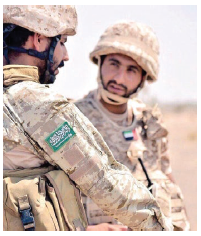
DM: Is getting a Canadian embassy in Yemen a goal of yours?
JAAS: We are hoping, of course, and encouraging. We also hope to see more business presence in Yemen from Canada. The government is operating from the temporary capital of Aden. [Canada] could establish an embassy in Aden, then eventually in Sana’a, our capital [which is currently under siege by the Houthis.]
For me, I don’t want Yemen to be forgotten in this dilemma. I want Canadian friends to know there is a country called Yemen. It is one of the oldest civilizations. People are very friendly and kind and eager to rebuild. They believe in democracy. We share a lot of values with Canada. We can benefit from Canada’s experience in the federal system. We have many models we can study. Besides that, I’d like to promote our relations in all fields, not just politically. I met some high officials and ministers who are welcoming that, but the current situation isn’t helping. By the same token, they expressed their willingness to engage as soon as things get better. I invite all parties in parliament, and especially the foreign committee, to visit Yemen.
I would like to thank Canadians for all their support and their wishes to restore our country. We look to Canada as an honest broker. It has no history of colonization. Your wisdom and honesty will be valuable in restoring our country and returning to normal soon. Yemenis are [suspicious] of some countries, but they’re not suspicious of Canada.
DM: With the government in disarray, to whom do you report on a daily basis? Do most Yemenis still consider allegedly deposed president Hadi their leader?
JAAS: I report to President Hadi’s government. It’s based in Aden as a temporary capital. We shouldn’t forget that President Hadi is a legitimate president, elected a vast majority of Yemenis. He received his authority from ex-president Saleh. Regionally and internationally, he’s been recognized as the president of Yemen and legitimate government head.



